
Margaret Liu, at left, and Nayna Anwar listen to a presentation by Sula Beachwear founder Macarena Morillo as part of the team’s fact-finding meetings. Anwar’s family emigrated from Bangladesh, and her parents told her stories about family members who worked in the dangerous textile factories in the country. Photo by: Isadora Romero
A PERSONAL LINK TO SUSTAINABLE FASHION
During a break in the clouds, when the sun peeked out in between scattered rain showers, the Kellogg team gathered at a small table outside a Quito shopping center. There was hardly enough room for their laptops. They quizzed Sula’s founder on its sales, manufacturing process, and impact stats.
Nayna Anwar, an Evening & Weekend MBA and a CRM marketer at Humana, asks about the sustainability of Sula’s dye and labels. Sula contracts with a company that reuses water in its dyeing process while dyeing just one side of the fabric to reduce its use of chemicals, Macarena explains. Its apparel labels are 100% biodegradable.
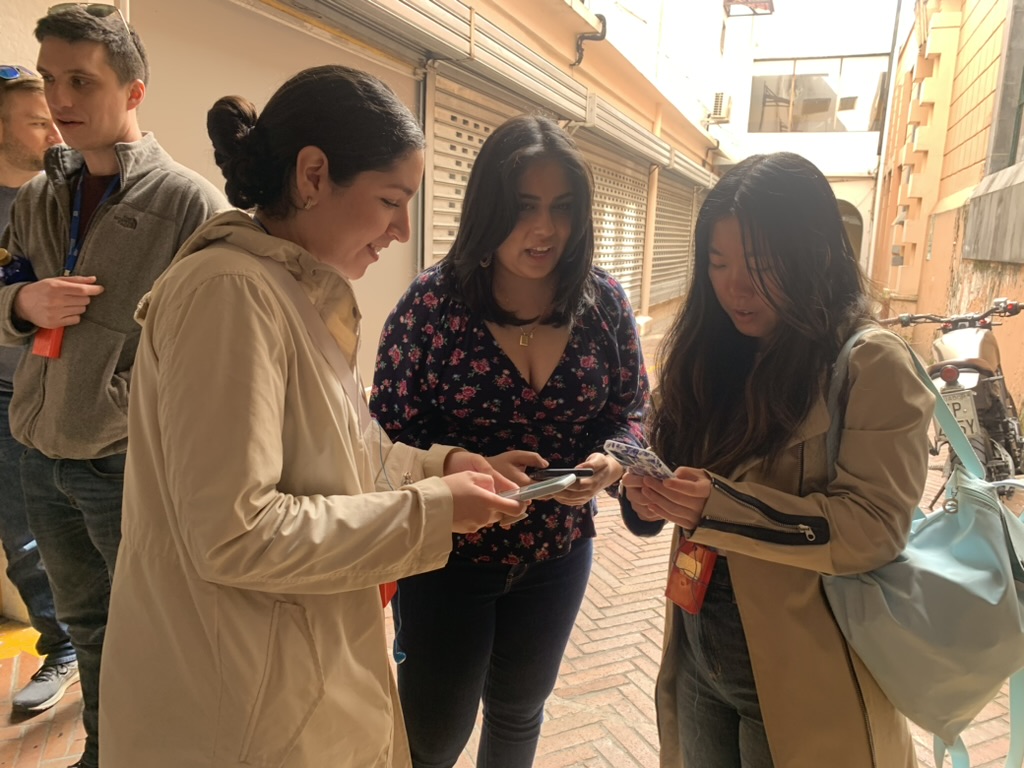
Camila Sanchez, Nayna Anwar, and Margaret Liu finalize plans to meet with seamstress Raquel Llumiquinga via text during a tour of Quito’s historic district. Each team was required to find and arrange meetings with locals working in their sector of study during the in-country trip. Photo by Kristy Bleizeffer
Studying sustainable fashion is somewhat personal for Anwar. Her parents emigrated from Bangladesh, a country with some of the world’s largest textile factories and notoriously hazardous working conditions for the sewers, largely women and children.
“A lot of Bangladesh’s GDP is actually dependent on foreign businesses that go there and exploit. Seeing that growing up, and hearing the stories from parents about family members that had been killed by factory fires after they were locked in, I’ve always been intrigued by sustainability,” she says.
In her team meetings in Ecuador, she’s been inspired by a different model for manufacturing at a smaller scale. Small companies, like Sula and Remu, who work directly with local sewers, waste pickers, artisans, and more, have been able to carve out profitable niches with consumers who want ethically made products. Since its founding in 2021, Sula’s revenue is projected to grow from about $110,000 in 2022 to between $300,000 and $350,000 this year. It expects to hit $1 million in 2024.
While MBAs tend to focus on margins, profits, and business tactics, they rarely get the opportunity to see them in context, Anwar says.
“I think Professor Kashner was very smart in choosing Ecuador as a country of focus for her class. There’s just a respect for nature and each other, for their culture and heritage, and we see it even in the smallest of interactions with people here. I think sometimes we lose that translation in the U.S., especially in the business context,” she says.
Visiting these small, successful ventures in an emerging economy like Ecuador gives her hope. Sustainability is often not a priority in emerging economies because they depend so heavily on outside investors and industry. “But sustainability is even more important in these countries because the government is often basically crippled. If companies don’t care about it, then it’s never going to be on the docket,” she says.
SUSTAINABILITY AT LARGE AND SMALL SCALES
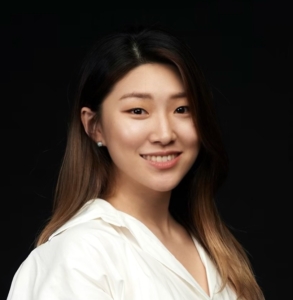
Clair Cho, two-year MBA ’24
For Claire (Yoonsung) Cho, a full-time MBA in the class of 2024, a big takeaway from this class is the different challenges large, storied corporations, like Nestle Ecuador, have in tackling sustainability and impact initiatives compared to smaller, more nimble companies. While corporations may put talent and resources behind real sustainability goals, they must incorporate them into manufacturing, supply chain, and distribution processes that have been entrenched for decades.
It’s easy to scoff at efforts by these large corporations to improve their footprints on the world and communities. Their volumes are so large, they can’t change on a dime. Measurable impact will take time and considerable resources, a lot of pieces and players have to buy in.
Cho, of South Korea, previously worked in marketing and project management at Samsung Electronics. There, she got the chance to work on sustainable packaging as well as a sustainable marketing campaign for the electronics giant. “I discovered that a myriad of companies were integral to the value chain responsible for the realization of such endeavors. This intensified my interest in climate change, and I was eager to learn how companies measure the impact of these initiatives through this course,” she tells P&Q.
Cho heard about the GIM courses even before she was accepted into Kellogg. When she saw a class on sustainability and impact, and the actual measurement of the space, she jumped at the chance. She is concentrating her MBA on tech management and data analytics. After graduation, she plans to return to tech.
“I would like to join a team where I can make a tangible impact on the sustainability sector. However, I am also open to exploring more about sustainable tech startups and sustainable investing, and I plan to do so while I am at Kellogg.”
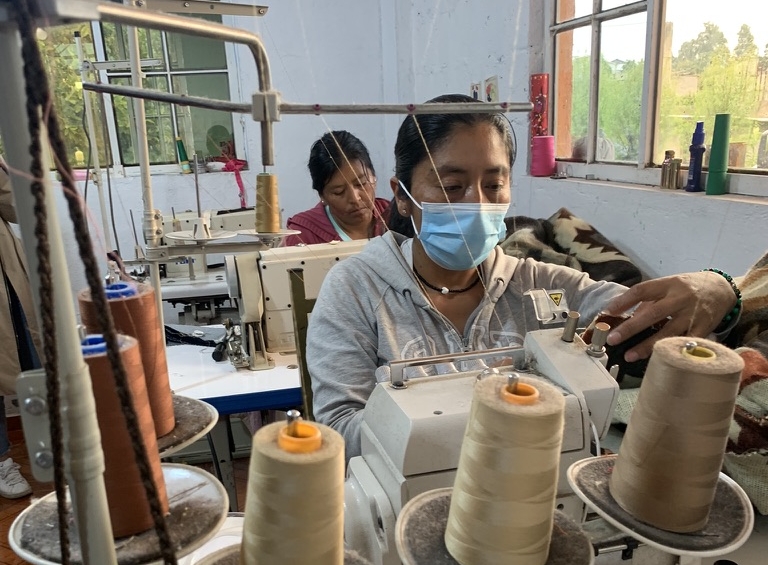
Raquel Llumiquinga works in her in-home studio, tailoring garments for Remu Apparel, an Ecuadorian sustainable fashion brand. Photo by Kristy Bleizeffer
‘TAILORED BY RAQUEL LLUMIQINGA’
The inside of Raquel Llumiquinga’s home sewing studio is stacked, corner to corner, with spools of thread in varied shades, fabric scraps, scissors and other tools of the Trade. A room to the right holds six sewing stations with specialized machines. A worktable is piled with traditional blankets made by indigenous artisans, the material for Remu’s signature Peguche jacket. Each is fitted with a leather label that bears the name of the seamstress that stitched it together. “Remu Apparel. Tailored by: Raquel Llumiquinga.”
“She says this really inspires them,” Sanchez translates for Raquel. “Remu says it should have their name on it since they are the ones that make it. That really motivates them as well.”
Remu’s team delivers 100 new blankets to Raquel’s house every two weeks, and then takes the finished jackets back with him. Raquel’s team also sews the denim jackets made from recycled jeans.
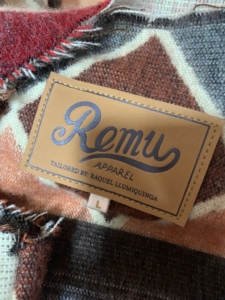
Each garment comes with a label bearing the name of the seamstress who tailored it. Photo by Kristy Bleizeffer
Three other seamstresses work with Raquel in her studio. It allows them to work close to home without having to commute to a factory.
Growing up in her town, it is the custom that women are seamstresses and the men are mechanics, Sanchez translates to her classmates. Raquel started seamstress school at 12 years old. She didn’t like it at first, but didn’t really have a choice. Often, women had to work far from home when there wasn’t work in their areas. At 15, she found work on a textile factory assembly line, perfecting different skills in the process.
As she grew older and started a family, she would leave her son with her mother while she worked. She missed birthdays and Mother’s Day.
Eventually, an uncle introduced her to Remu’s founders and her life changed. She has more time with her children, and earned enough to build that second story. Her husband and kids will help her cut fabric or other small tasks and they make it a family affair. Her children want to study STEM and are inspired to go to college, which would have been an impossible dream before.
“She gave us so much detail, and I didn’t ever really have to ask. She was so happy to share her story,” Sanchez tells P&Q. “It was refreshing to see how much she cares, and of course that impact that it’s had on her life.”
‘WE WILL NEVER FORGET THIS’
Before she let them leave her house, Raquel hugged each of her five Kellogg visitors. She told them in Spanish not to forget her and her team of seamstresses.
Margaret Liu, a two-year MBA with a focus on entrepreneurship and social impact, was moved by Llumiquinga’s passion for the work and the relationship with Remu. That was not lost, even in translation.
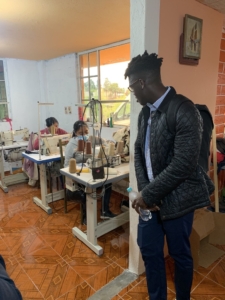
Manny Adediran watches the seamstress work in Raquel’s home studio. Photo by Kristy Bleizeffer
Fun fact: Liu, standing barely five feet tall, writes a fashion and lifestyle blog called The Petite New Yorker. Devoting the entirety of this course to study sustainable fashion was very on brand.
“I’ve always been interested in sustainable fashion and fashion in general, but hearing the process of how these brands make the clothes, and meeting the people who actually make them, makes me think about what I, as a consumer, am choosing to put my money towards,” she says. “I think being able to empower these women by purchasing from these brands, and spreading the word for social impact, is something we can do as everyday humans. That was really powerful.”
Her big takeaway is how different sustainability and impact looks across companies, across sectors, across industries, and even down to individual consumers. It’s a mix of acts big and small, from a corporation diving into its value chain to cut its emissions to a small brand working to improve circumstances for a few families, to a fashionista searching out sustainable brands and looking for ways to improve her own behaviors and community.
“Raquel was such an incredible storyteller. You could tell she was so proud of the work, and of that little tag with her name alongside the company’s,” says Liu.
“As we left, she said, ‘Don’t forget about us.’ I don’t think she realizes how impactful this opportunity was for us, and I’m sure for her as well. It’s something we will never forget.”
DON’T MISS: INSIDE AN ELITE EXPERIENTIAL MBA COURSE: KELLOGG’S GLOBAL INITIATIVES IN MANAGEMENT AND WHAT’S NEW IN KELLOGG’S ‘FOUNDER FOCUSED’ ENTREPRENEURSHIP PROGRAM





Questions about this article? Email us or leave a comment below.